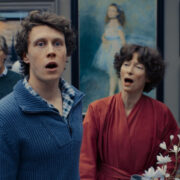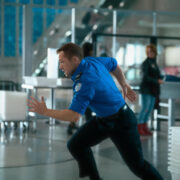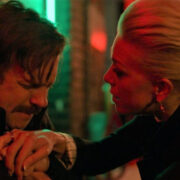“You Have To Get Dirty:” Independent Filmmaker Nick DeRuve’s Long Road To Toronto
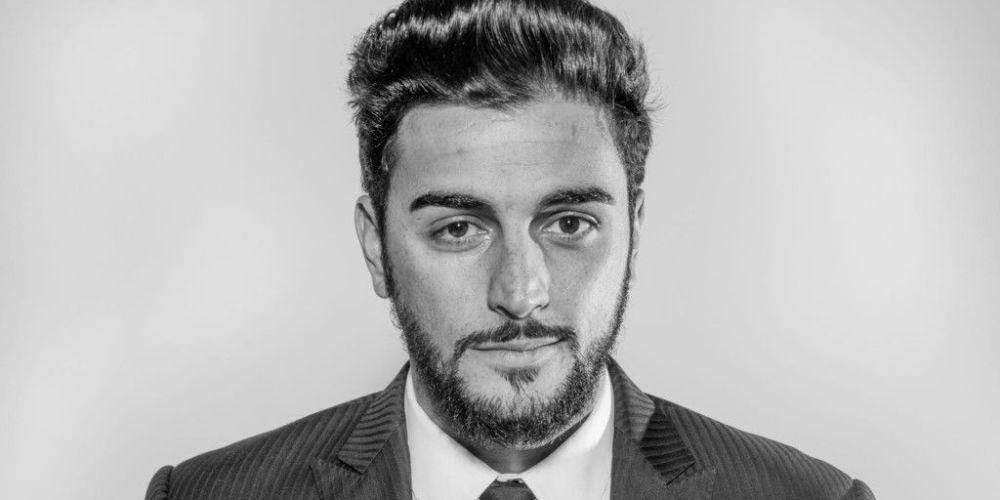
Jim Dixon retired from practicing law not a moment too…
Six foot plus, Nick DeRuve looks a movie star. And although he’s done some acting, it’s on the other side of camera, as a screenwriter and director, that the young filmmaker is intent on making his mark. It’s been a long road for DeRuve, from Schenectady, in upstate New York, to LA, and longer still to Toronto, where his movie The Runaway was recently screened. The Runaway has been screened at no fewer than fifteen festivals in five countries, winning fifteen awards including Best Film, Best Director, Best Screenplay, Best Cinematography, Best Original Score and six different performance awards.
A graduate of Niskayuna High School, DeRuve got his undergraduate degree at Long Island University, CW Post. A near fatal car accident following his freshman year landed him in a wheelchair for months, and cost him years of rehabilitation. Defying the medical professional opinions, he was walking back on campus six months later.
From Schenectady to Hollywood
After graduation he produced, wrote, co-directed, and starred in a no-budget feature film that made a theatrical debut at the Proctor’s GE Theatre in his hometown of Schenectady, New York. DeRuve began his professional career in the grip and electric department in spite of the rods in his legs. He freelanced around the tri-state area for four years before deciding to return to school. Making the move from New York to Los Angeles, DeRuve he began graduate work at New York Film Academy at Universal Studios.
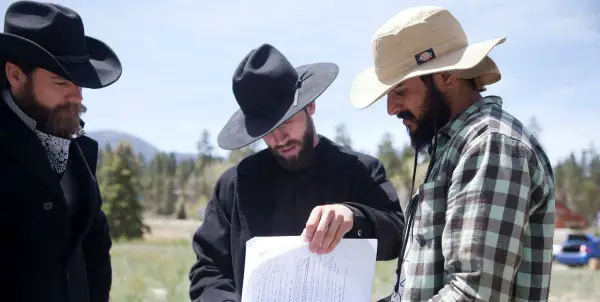
“At the time the school was at Universal Studios and it was an amazing program,” he says. “Every day we are shooting on the back lot. We see all of the filmmakers walking around, including Steven Spielberg popping in. It was pretty cool.”
The Students meet Mr. Spielberg
There’s an old story about Spielberg waving at the security guard at the gates to Universal, being waved in, and then watching various movies and TV shows in production. Widely dismissed as apocryphal, Spielberg told the students at New York Film Academy LA the story himself:
He had this package and he ran to the security guard and whatever film at the time was in production, he said… “I have to get this package to the director now! Right now!” The guard says “Well you better go” and he lets him in. and he starts making phone calls from one of the vacant offices and producing a movie. His call back number is Universal and three months later he gets called into the president’s office and he’s got a bill of $5,000 for these phones calls and he’s like “who the hell are you?” Spielberg says,”I’m Steven Spielberg, I’m trying to produce this movie.” And that movie turned out to be Duel which is his first made for TV.
“You know I love it,” DeRuve says of Duel. “because you can see all the mistakes of a young Steven Spielberg, shadows of the camera, and boom drops every now and then. Little things like that. That’s actually really encouraging to see that. You know that Steven Spielberg even made his mistakes.”
Shooting The Runaway on the run
Of course Spielberg was working on a seventies TV schedule when he shot Duel, probably no more than fourteen days. The Runaway had even less production time: “We shot The Runaway in like twelve days. Not only in twelve days, but we were on location in Big Bear, California. We weren’t in LA. So my whole entire crew, everybody, we were away for two weeks and that was a pretty incredible experience.”
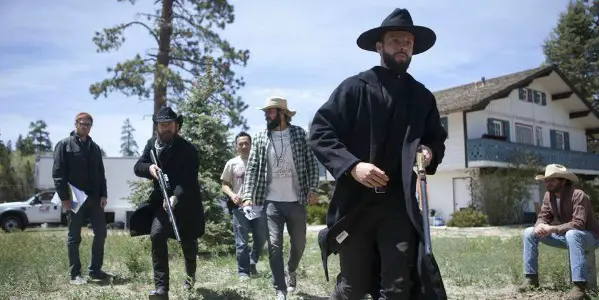
Shooting on such a low budget and tight schedule require not only dedication from his cast and crew, but the community of Big Bear as well:
We were going up to Big Bear every weekend for 6 months before we shot. We knew almost everybody in the town by the time we were done with this thing. It’s a period piece, the 50s and 60s. We had 14 period cars including a ‘67 Mustang, 57 Chevy, gorgeous cars, all for free. All donated. Every location we shot at was free. Big Bear’s film commission granted us all the permits for free. That’s what it really requires. Free might sound weird but they believed in what we were doing because we showed we gave a crap about them. We were respectful of them…You know that saying, it takes a village, well, there’s no way to get a film made without a village.
DeRuve glows talking about his cast for The Runaway:
Eric Michael Cole plays Maverick in the film. He was in Gia, he was in White Squall, he was in a bunch of really good films and then he took some time off for personal reasons. Richard Hench, who is the star of The Runaway, and I have been working with 6 ½ years, one of my best friends and I live with him actually, he was in this pie shop in North Hollywood. He’s sitting there eating pie and drinking coffee and he looks over at this guy who has this cool look about him and he didn’t know it was Eric Michael Cole. He walked up to him and he told him about our project and he said, we start shooting in three days and we haven’t gotten this role cast yet…He came home, I called Eric that night, we spoke, he loved it. He came out and he’s awesome in the movie…Richard Hench and I have done like 5 or 6 films together. This is our first feature together…This guy is in some cult classics like Scalps. Have you ever heard of Fred Olen Ray? He’s like a horror thriller guy from the eighties and Richard did like three or four films with him. So, I think what’s cool about The Runaway is that we have a lot of actors in there that have a lot of talent. Very, very good and they’re probably going to end up being “somebody” as opposed to being “somebody” right now.
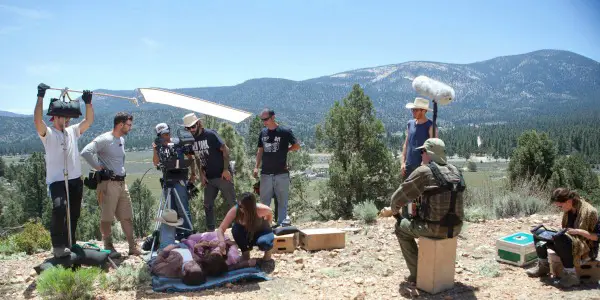
DeRuve has two big irons in the fire right now: the completed film The Runaway which is going to be screened in Toronto, and a screenplay in competition: “We’re screening The Runaway in Toronto in a month or so. We’ve been screening since last October – it’s on the festival circuit, we’ve done fourteen festivals already and we have another six in the lineup. We’ll be doing festivals through Halloween weekend.”
The Birth of Electric City
The new screenplay is entitled Electric City, which is a long-standing nickname of Schenectady, New York, the birthplace of General Electric. The screenplay has been accepted into eight screenplay competitions worldwide including the prestigious Orlando Film Festival and Oaxaca FilmFest. Electric City won top honors at Indie Film Festival in Sweden, the Gold Award at LA Neo Noir Film Festival, and placed top 100 at Table Read My Screenplay Park City, and was a finalist in the 2016 Hollywood Screenplay Contest. DeRuve is currently producing this film with name talent attached, looks to be filming in 2017.
Electric City is a passion project of DeRuve’s, and it’s come to close to being produced before: “It was about 5 ½ years ago when I finished graduate school, that’s when I first wrote the script. I was trying to produce the film then, we got really far into production and had spent a ton of money but I wasn’t able to complete the financing. The Schenectady Film Commission at the time was under a different regime and about six months into my pre-production plan, The Place Beyond the Pines showed up. It was pretty hard to compete with a $20 million film with all these stars in it.”
The Place Beyond the Pines, which starred Ryan Gosling, Bradley Cooper, Eva Mendes and Ray Liotta, absorbed the available attention and resources. The near miss stung, but DeRuve used it as a learning experience:
Honestly, it took the wind out of our sails and the film kinda fell apart. I went back to LA and that’s when I wrote and made The Runaway. After I finished The Runaway I rewrote Electric City, because I had gone through kind of a nightmare of a time with different agencies and different talent and financiers telling me what they wanted the movie to be, and because I was young I was just chasing an opportunity to get my film made, I did 34 rewrites and eventually the script became something that it wasn’t supposed to be. It no longer stood for what I believed in, so, after I made The Runaway I rewrote it.
The idea for the screenplay has had a long gestation period. Electric City has literally been on DeRuve’s mind for two thirds of his life:
I first started having thoughts about this film when I was ten years old. I lived here in Schenectady and my step-brother and I spent a lot of time together. He’s quite a bit older than I am, so I would spend a lot of time with teenagers at the age of ten and a lot of these guys were up to no good…I started having this idea of two brothers that want to get out of this inner city that they are stuck in. Obviously when I was ten it was a very simple thought. Over the years it has evolved quite a bit.
It’s about is a single mother who works construction, survives an opioid addiction and when her family receives a final notice of eviction they all scramble for refuge in the streets of Electric City. It’s a slice of life type of film, a character driven film. Almost a fly on the wall kind of movie. And it’s about family, it’s about the common man. It’s about getting through adversity, never giving up. Never quitting no matter how rough things get. It’s Electric City.
Shooting Where the Story’s Set
DeRuve is absolutely determined to shoot Electric City in Schenectady, where the story is set: “Every single shot of Electric City is here. Every single one. Even with The Place Beyond the Pines they went other places. So we are doing the New York State tax credit for our shoot. We are using the Armoury for our sound stage, because we’ve got to shoot on a soundstage but every single shot will be here in Schenectady…I met with the Schenectady Film Commission and I am trying to tap into the local resources here. That’s why I want to shoot the movie here.”
In fact, the filmmaker has resisted opportunities to shoot in other areas, even though it would have helped get the film made already: “I have had offers to shoot the movie in other cities. A couple of years ago I had an offer to go to Atlanta, offer in Detroit. That’s not why I wanted to do it. It’s about this place. It’s about here and the people here. I want them to be involved and supportive of it, so that’s been the goal.”
Shooting Old School
DeRuve may be a new generation writer and director, but he’s surprisingly and refreshingly old school when it comes to production techniques. He shoots exclusively on film and defends that decision passionately: “My undergraduate program was not only shot on film but cut on a flat bed,” he says. “I got film strip hanging around my neck, I’m there till five AM, doing cuts. I really learned film, so I am proud to say I am a filmmaker. When I went to grad school, there were twenty-six students in my class. Twenty-five films shot on digital, and one on film.”
There are advantages to editing with film, which DeRuve appreciates: “It’s the best thing in the world, I think. Especially when all the film is wrapped around you and that’s when you really see how your shots come together cuz you are actually holding that strip and you are actually looking at them and then you can see how your frames match and how things line up.”
“I think that Martin Scorsese has the largest private 35 mm print collection in the world, private collection,” DeRuve muses. “He’s probably my favorite filmmaker of all time, my idol and he is huge in the film preservation aspect of things and keeping film alive. Tarantino does as well but I think…” He pauses. “l don’t know if you want to hear my opinion about Tarantino.”
Of course we do..
“So, I saw The Hateful Eight on a screen, 70 mm and I was thrilled. Any chance I can get to go to a 70 mm theater screenings, I do. I’ve seen Lawrence of Arabia, 2001: A Space Odyssey, all the way up to The Master. So I am a junkie about this stuff. So I go to see The Hateful Eight in 70 mm, maybe one quarter of the movie was exterior. The whole movie was shot inside…”
Size Does Matter
DeRuve doesn’t think modern filmmakers are appreciate the unique dimensions of the big, theatrical screen:
What I see out of a lot of filmmakers is they don’t they’re not trained to direct for the screen. They are shooting 16:9 and that feels like sitting in your living room because all of our tv’s are 16:9. If you get a chance to see The Runaway, we shot on very old anamorphic glass from the 70s. So, it’s 2.35, essentially the cinescope of digital. And it looks gorgeous. I take a lot of pride in the fact that I was trained to direct for the big screen. And that’s what the goal of The Runaway is, Electric City, it’s for the big screen. It’s a huge difference in how you frame your shots. How you set up your wides, your landscapes and I go to a lot of film festivals with The Runaway. Almost every film I see is 16:9 and should be watched in the living room and not the theater.
Does DeRuve think this is just the way they are being taught or is it that the movie will play four weeks at the multiplexes and then be available on home video forever?
I think that it has a lot to do with how many platforms there are to get your film seen nowadays. And I think that a lot of filmmakers, moviemakers, whatever you want to call them, they are very content with getting their movie into your home and into your living room, they are probably YouTubers, people who watch a lot of YouTube, who watch on their phones…They don’t go to the theater, they don’t go take the time to go to the theater to see 2001: A Space Odyssey in 70 mm print. And, when you see that you learn. For two and a half hours you are learning. That’s a really big deal and it’s a big difference. I saw The Shining in 70 mm…my God man, that’s when you really know that Stanley Kubrick is maybe the best ever because you see how he puts these frames together on the big screen, the symmetry, the size of characters against things, really, really important. So, maybe it’s the way their eyes are trained because of how they watch things.
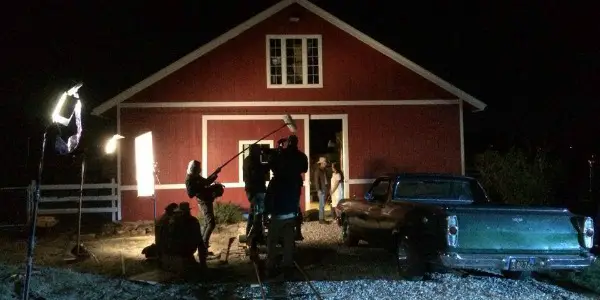
DeRuve is hoping to arrange a screening of The Runaway in Schenectady sometime in the next three months. Ten years ago he co-directed a feature film made for less than $5 thousand that played at the GE Theater in Schenectady’s historic Proctor’s Theatre. That event sold out two screenings. He is trying to stay involved in the community as much as possible, even when he’s working in New York or LA. He says:
I have been trying to get a screening together because I think that’s important for me to get Electric City to the next step because when people see the film they will see that I am not just a guy trying to make movies…I have been working professionally for over a decade and this movie is well put together, it’s a really well made movie…There is definitely a difference in final product. I need people to see that here. It’s like they just read about the awards it doesn’t really mean anything to them until they see it. The awards are cool but you’ve got to see the movie.
Advice to the Aspiring Moviemaker
DeRuve has worked on indies and B movies as a key grip, a gaffer and an electrician. So when he’s asked what advice he has for aspiring filmmakers, perhaps his answer isn’t surprising:
To work on set. I cannot stand working for directors who just show up and aren’t directors. No one just shows up and is a director. So, when I was 19 years old, I was begging and begging to get on sets. I hadn’t graduated from college yet…So I begged this teacher to get me on set man, I gotta work with my hands. I need to get dirty. He was shooting a film at Universal Studios Florida during our spring break and I drove down there and slept on some floors, slept in a car, slept here and there and I gripped on this film for like ten days. The education that I got in that ten days surpassed the two years I had in college already shooting on film…Every time we are done with work, I take an apple box and I get as close to the director as I can until they tell me to back up. And I have been told to back up probably a thousand times in the last ten years. And that’s a very good thing. I sit there and learn…That’s my long winded answer of saying you have to work, man.
“You have to bet on set and you have to get dirty and you have to be willing to learn and keep your ego at home.”
What do you think? Is the future of cinema still on film, or has home video taken over the medium?
https://youtu.be/jfZs5in2eeg
Does content like this matter to you?
Become a Member and support film journalism. Unlock access to all of Film Inquiry`s great articles. Join a community of like-minded readers who are passionate about cinema - get access to our private members Network, give back to independent filmmakers, and more.
Jim Dixon retired from practicing law not a moment too soon, and now works as a freelance writer and film critic. A lifelong and unrepentant movie geek, he firmly believes that everything you need to know in life you can learn at the movies. He lives in upstate New York.


